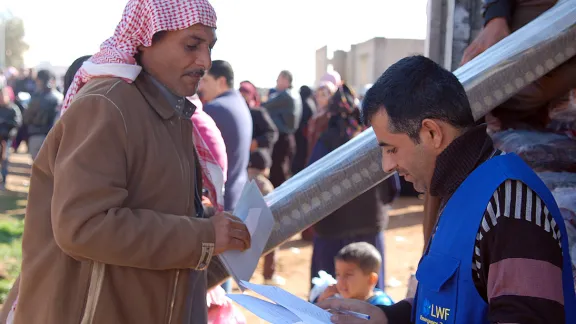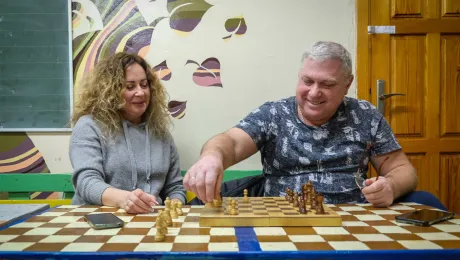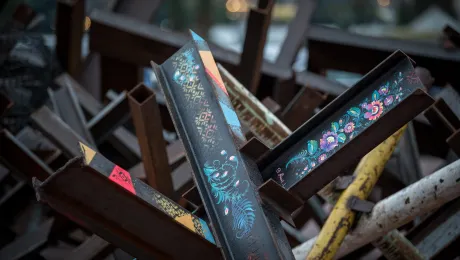
The LWF assists Syrian refugees inside Zaâatari camp and in Jordanian host communities. Photo: LWF Jordan
AMMAN, JORDAN 27 February 2015 - At the start of every negotiation session between the Syrian regime and the opposition—whether in Geneva, in Cairo or in Moscow—the participants have observed a moment of silence to honor Syria’s fallen.
But what about the Syrian refugees?
Over the past four years, violence has spread with unprecedented speed and intensity in Syria, leaving behind hundreds of thousands of victims—mainly civilians—and pushing millions of others to flee the country. Fighters and jihadists from all corners of the globe have gone to fight “their” cause in Syria. Meanwhile, their presence has endangered Syrian social fabric, destroyed Syria’s cultural heritage, and imposed brutal, barbaric rule in areas under their control. This war has been described as the tragedy of the century.
After four years of war, the number of Syrian refugees, according to UNHCR figures dating from 4 February 2015, stands at 3,811,574.
Many observers judge that these statistics would be higher if it weren’t for limitations imposed by several countries, especially Jordan, which is tightening its control on the borders and thus limiting the number of refugees fleeing into the country. For many valid reasons, Jordan fears the influx of refugees into its national territory; their primary concern is more political in nature than economic.
According to some analysts, the journey also has become too dangerous and costly to undertake for many Syrians in both financial and physical terms. Forced to cover vast distances inside Syria before reaching international borders, the risks are tremendous; and sometimes only part of the family arrives, while the rest stay behind or move elsewhere.
Refugees in the neighboring host countries are subject to movement restrictions; others, to deportation and detention. These measures affect family unity and the role played by the family in Arab culture; the available protection system; and the vulnerability faced by refugees in general, who are often at risk of diverse rights violations and abuses, including sexual and gender-based violence.
What’s more, in Jordan—and again, for many sound motives—refugees are not allowed to work or receive vocational training. Very few of them have the opportunity to seek higher education. This reality places hundreds of thousands of refugees at the mercy of donors, states, and agencies, as well as those sectors of the international community that are financially supporting refugees in Jordan. (While underfunded, scores of refugees are still being fed, clothed, and housed by the international community.)
In studying this panorama, there are two main concerns. The first is a financial one: how long will the international community keep [supporting] the refugees? And second, what will happen to an entire generation of young people—dropping out of school at alarming rates, largely uneducated and untrained—when the crisis ends and refugees return to Syria?
Regardless of the political solution ultimately reached for the Syrian crisis, Syrian refugees must be able to return home and participate in rebuilding their country. After four years of war and violence, there is no apparent single party, official, or opposition figure talking about the refugees’ plight. In the latest meeting between the regime and the opposition in Moscow—which provided a glimmer of hope that the crisis could be solved peacefully—the refugee issue was conspicuously absent from the agenda. In their final statement, they [parties to the conflict] spoke about maintaining sovereignty, unity, and independence; about combating terrorism and extremism; about democracy and freedom of expression. They spoke about finding peaceful solutions, and they spoke against foreign intervention in Syrian affairs. But they did not speak about their own country’s refugees.
These are all important priorities; but how will [the parties to the conflict] possibly fulfill them if they ignore the nearly four million refugees altogether? How will the refugees be received and supported? How, in concrete terms, can refugees take part in healing and reconstructing their country? Many analysts write about refugees, especially the young ones, as a ticking time bomb: they have had no education, no training, no work, no dreams, and no hope.
For these young people to take part in building their future, we urgently see the need to empower them to get organized and speak up for themselves. We should pledge to make their voice heard, amplify it and ensure their needs and concerns are taken seriously when designing the future solutions for Syria. Without this, there is little chance to see in the future a peaceful and democratic Syria.
Mr Rifat Kassis is the LWF Department for World Service country program representative in Jordan.


